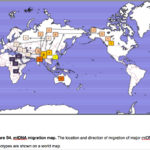
World Science en Route from Out-of-Africa to Out-of-America: First Stop is Out-of-Asia
bioRxiv doi: https://doi.org/10.1101/101410 Yuan, Dejian, Xiaoyun Lei, Yuanyuan Gui, Zuobin Zhu, Dapeng Wang, Jun Yu, and Shi Huang Modern Human Origins: Multiregional Evolution of Autosomes and East Asia Origin of Y and mtDNA Recent studies have established that genetic diversities are mostly maintained…
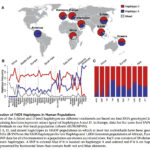
Encephalization, Fatty-Acid Metabolism and Modern Human Origins
American Journal of Human Genetics 90 (2012), 809–20. doi: 10.1016/j.ajhg.2012.03.014 Genetic Adaptation of Fatty-Acid Metabolism: A Human-Specific Haplotype Increasing the Biosynthesis of Long-Chain Omega-3 and Omega-6 Fatty Acids Ameur, Adam, Stefan Enroth, Asa Johansson, Ghazal Zaboli, Wilmar Igl, Anna C.V. Johansson,…
Human Kinship Systems and Human Origins: A Powwow Highway from AAA to AAPA Meetings
I recently returned from the American Anthropological Association Meetings in Washington DC where I presented a paper on kinship, enjoyed the company of other members of the interdisciplinary “Kinship Circle” group led by Dwight Read and Fadwa El-Guindi, socialized with my…
The End of Out-of-Africa: A Copernican Reassessment of the Patterns of Genetic Variation in the Old World
Over at Anthrogenica, I’ve been having some heated (as always) but this time also productive discussions regarding the interpretation of currently available genetic evidence. In the following I will sketch out a hypothesis that increasingly makes sense to me. 1….
Out-of-America Theory and the Race Debate
The topic outlined in the title of this post is huge and I can’t give justice to it at this moment. But considering how dramatic of a revision of modern human evolutionary history the out-of-America theory is offering, it is…
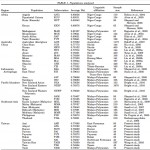
Is Taiwan to Austronesians what America is to Modern Humans?
American Journal of Physical Anthropology 150 (4): 551–564, April 2013 Ascertaining the Role of Taiwan as a Source for the Austronesian Expansion Sheyla Mirabal, Alicia M. Cadenas, Ralph Garcia-Bertrand, and Rene J. Herrera. Taiwanese aborigines have been deemed the ancestors…
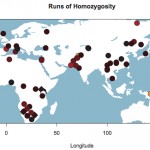
Clicks and Genes: Linguistic and Genetic Perspectives on Khoisan Prehistory
Science DOI: 10.1126/science.1227721 Genomic Variation in Seven Khoe-San Groups Reveals Adaptation and Complex African History Carina M. Schlebusch, Pontus Skoglund, Per Sjödin, Lucie M. Gattepaille, Dena Hernandez, Flora Jay, Sen Li, Michael De Jongh, Andrew Singleton, Michael G. B. Blum,…
Typological Linguistics and Population Genetics: A Synthesis or a Controversy
Trends in Cognitive Sciences Vol 16, Issue 3, March 2012, Pages 167–173 http://dx.doi.org/10.1016/j.tics.2012.01.007 Tools from Evolutionary Biology Shed New Light on the Diversification of Languages Stephen C. Levinson, and Russell D. Gray Computational methods have revolutionized evolutionary biology. In this paper…
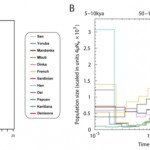
A High Coverage of the Denisovan Hominin
Science 30 August 2012 DOI: 10.1126/science.1224344 A High-Coverage Genome Sequence from an Archaic Denisovan Individual Matthias Meyer, Martin Kircher, Marie-Theres Gansauge, Heng Li, Fernando Racimo, Swapan Mallick, Joshua G. Schraiber, Flora Jay, Kay Prüfer, Cesare de Filippo, Peter H. Sudmant,…
A Seismic Shift in Human Origins Research, or a Downward Slide?
A new research paper is out which has created a lot of media buzz. “Evolutionary History and Adaptation from High-Coverage Whole-Genome Sequences of Diverse African Hunter-Gatherers, “ by Joseph Lachance et al. reports “archaic admixture” in three African hunter-gathering populations…
Out-of-Africa in the Mid-Pleistocene: A New Interdisciplinary Paradigm or a New Myth?
In the comments section on this blog, Dienekes raises the issue of interdisciplinary support for the out-of-America theory. Since I’m a big proponent of interdisciplinarity, the seeming convergence of genetics, archeology and paleobiology on the origin of modern humans in…
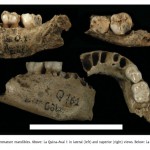
Early Aurignacian Dentition and Why Paleontology Is a Moving Target
Journal of Human Evolution (In Press, Corrected Proof) The Early Aurignacian human remains from La Quina-Aval (France) Christine Verna, Véronique Dujardin, and Erik Trinkaus. There is a dearth of diagnostic human remains securely associated with the Early Aurignacian of western…
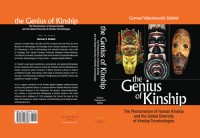
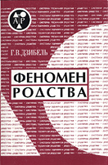
Recent Comments